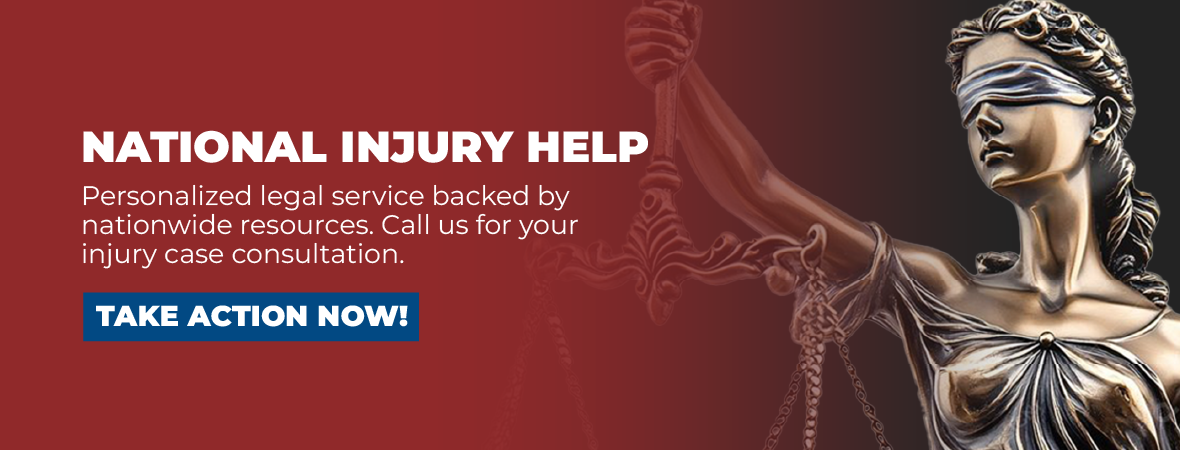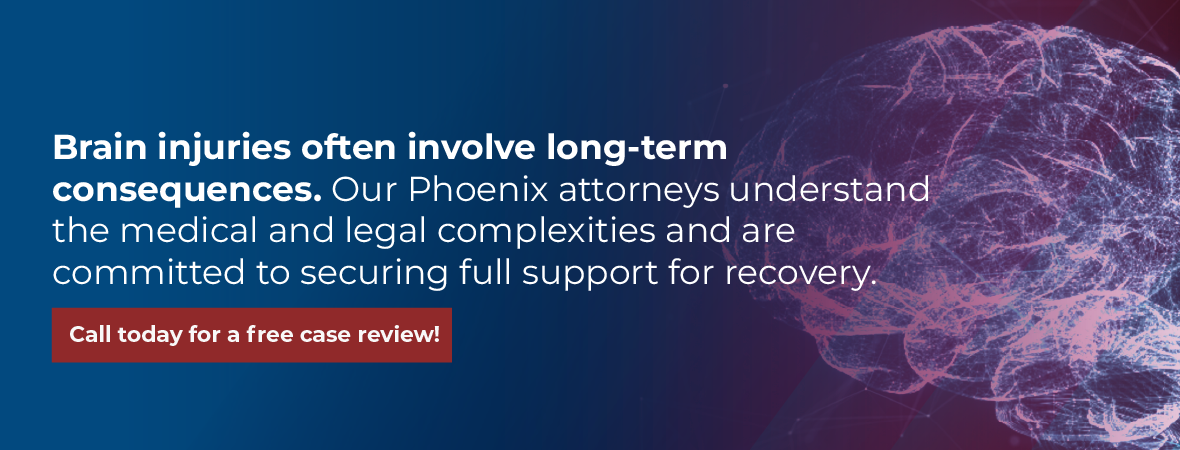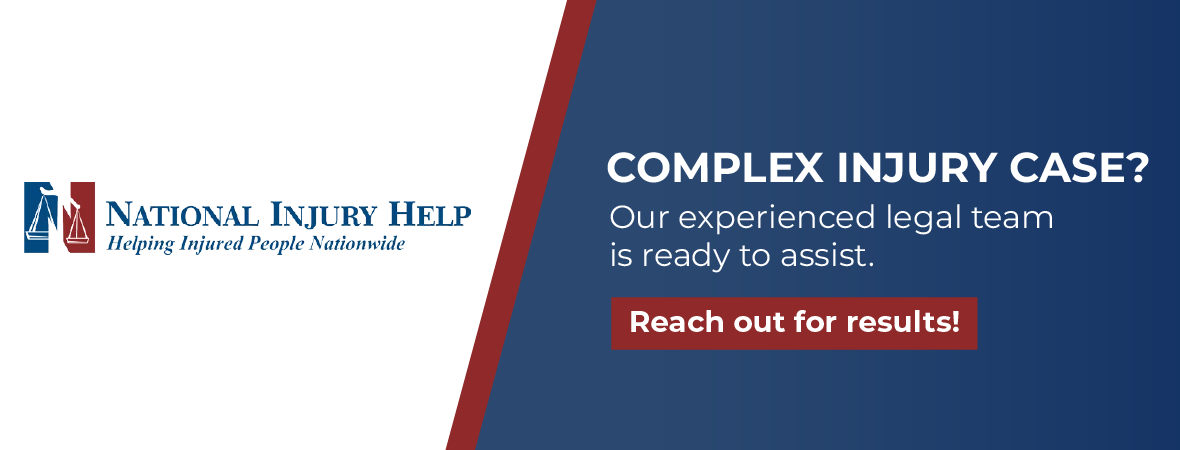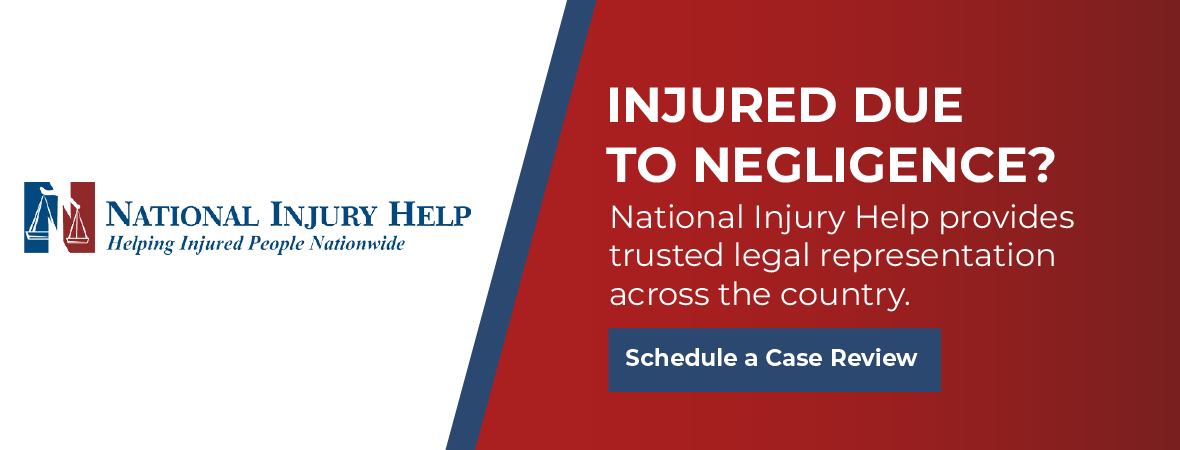We understand your challenges after a Phoenix brain injury and are here to guide you with compassion, experience, and determination. You don’t have to go through this alone; let our legal team at National Injury Help work for you today.
A traumatic brain injury is one of the most devastating medical emergencies a person can endure. Whether it happens in a car crash on I-17, a fall at a construction site in Downtown Phoenix, or a violent collision on Loop 202, a serious head injury can affect every aspect of a person’s life, physically, emotionally, and financially.
If you or a loved one has suffered a brain injury due to someone else’s negligence, it’s critical to understand your legal rights and options. A skilled Phoenix brain injury lawyer can help you pursue the compensation and long-term support you deserve.
The Devastating Impact of Traumatic Brain Injuries
Brain injuries are not always immediately visible, but the damage they cause can be profound and permanent. From memory loss and mood disorders to impaired mobility and reduced cognitive function, the consequences often ripple through a victim’s personal relationships, career, and ability to live independently.
If someone else’s carelessness caused your injury, whether a distracted driver, a negligent property owner, or an unsafe work environment, you may be entitled to head trauma injury compensation through a personal injury claim.
Why Having the Right Legal Representation Matters
Navigating a brain injury claim is not simple. You’ll need to prove liability, demonstrate the full scope of your injuries, and anticipate future medical costs, rehabilitation, and loss of income. Insurance companies may try to downplay the severity of your condition or rush you into a lowball settlement. That’s why working with an experienced TBI attorney in Arizona can make all the difference. Your lawyer will advocate for your rights, consult medical experts, and fight to ensure you receive every dollar you are owed.
In the following sections, we’ll walk you through what a brain injury case involves, the types of compensation available, and how a dedicated Phoenix brain injury lawyer can support you through every stage of your recovery and legal journey.
What Is a Traumatic Brain Injury?
A traumatic brain injury occurs when a sudden impact or jolt causes damage to the brain. TBIs range in severity from mild concussions to catastrophic injuries that result in permanent disability or death. These injuries can disrupt the brain’s normal function, leading to physical, emotional, and cognitive impairments that affect every part of a victim’s life.
Understanding what qualifies as a TBI and the different types of injuries involved is essential for victims and their families. Suppose your injury was caused by another party’s negligence, such as a reckless driver, a negligent employer, or unsafe property. In that case, you may be entitled to compensation with the help of a qualified Phoenix brain injury lawyer.
Types of Traumatic Brain Injuries
Not all brain injuries are the same. They vary in severity and cause and may present different symptoms depending on which part of the brain is affected. Common types of TBIs include:
- Concussion: Often caused by a blow to the head, concussions are considered mild TBIs but can still have lasting effects like memory issues, dizziness, and headaches.
- Contusion: A bruise on the brain tissue, typically resulting from a direct impact.
- Coup-contrecoup injury: This occurs when the force of an impact causes the brain to strike the opposite side of the skull, resulting in injuries to both sides.
- Diffuse axonal injury: Caused by shaking or rotational forces, these injuries involve widespread damage to the brain’s connecting fibers and can result in loss of consciousness or coma.
- Penetrating injury: When an object pierces the skull and enters the brain, it often results in severe and localized damage.
Severity Levels of TBIs
Traumatic brain injuries are classified into three categories based on their severity:
- Mild TBI: Often involves brief loss of consciousness or altered mental state. Symptoms may include headaches, fatigue, difficulty concentrating, and mood changes.
- Moderate TBI: This may involve loss of consciousness lasting minutes to hours. Victims often experience confusion, impaired memory, and motor skill difficulties.
- Severe TBI: Typically includes prolonged unconsciousness or coma. These injuries can lead to lifelong disability, cognitive decline, or even death.
Even so-called “mild” TBIs can have significant long-term consequences and should not be taken lightly.
Phoenix Brain Injury Attorney Explains the Difference Between Acquired vs. Traumatic Brain Injuries
While TBIs are caused by external force (e.g., falls, crashes, or assaults), acquired brain injuries occur due to internal factors such as strokes, tumors, or oxygen deprivation. Both can cause similar symptoms and life-altering effects, but the legal claims process is typically different. A TBI attorney in Arizona focuses on cases where the injury was caused by another party’s wrongful actions or failure to act.
Understanding the nature and extent of a brain injury is the foundation for building a strong legal case. With the help of medical experts and a skilled legal team, you can pursue the head trauma injury compensation you need to recover, adapt, and move forward.
Phoenix Brain Injury Explains Common Causes of Brain Injuries
Brain injuries can happen almost anywhere and under a wide range of circumstances. From the bustling highways surrounding Downtown Phoenix to the busy sidewalks of Roosevelt Row, traumatic brain injuries often occur suddenly and without warning. These injuries are often preventable and result from someone else’s negligence.
Identifying the cause of a brain injury is the first step in determining liability and pursuing compensation with the help of an experienced Phoenix brain injury lawyer.
Below are some of the most common causes of brain injuries in Phoenix and how they may lead to legal claims.
Motor Vehicle Accidents
Car, truck, and motorcycle accidents are among the leading causes of TBIs in Phoenix and throughout Arizona. High-speed collisions and rollover crashes are familiar with major roads like I-10, Loop 101, and Grand Avenue running through the Valley.
Brain injuries from vehicle accidents may result from:
- Direct impact with the steering wheel, dashboard, or windows
- Sudden whiplash causes the brain to move within the skull
- Ejection from the vehicle or being struck as a pedestrian or cyclist
Victims of these crashes may suffer concussions, contusions, or even penetrating injuries, particularly in high-impact collisions.
Falls and Premises Liability Incidents
Slip and fall accidents are a leading cause of TBIs, especially among older adults and workers in high-risk environments. These incidents often occur on unsafe properties, like poorly maintained sidewalks, wet floors in grocery stores, or uneven surfaces in commercial buildings.
Common scenarios include:
- Falling down stairs without handrails
- Tripping over loose cords or debris in a retail store
- Slipping on a wet floor with no warning signage
Property owners and business operators have a legal duty to maintain safe premises. When they fail to do so and a head injury occurs, victims may be entitled to head trauma injury compensation through a premises liability claim.
Construction and Workplace Accidents
Phoenix’s rapid growth has led to a surge in construction projects across the city, particularly in areas like Midtown, Tempe, and North Phoenix. Construction workers face elevated risks of brain injuries due to the nature of their work, including falls from heights, falling objects, and equipment malfunctions.
Typical brain injury risks on construction sites include:
- Falls from scaffolding, ladders, or rooftops
- Getting struck by tools or debris
- Vehicle or machinery-related accidents
If the injury occurred due to an unsafe work environment, lack of proper training, or defective equipment, a worker may be able to pursue compensation beyond workers’ comp by filing a third-party injury claim.
Sports and Recreational Accidents
While contact sports like football, soccer, and hockey are known for their brain injury risks, even non-contact recreational activities, like skateboarding or cycling, can lead to TBIs, especially when safety precautions are not followed.
Sports-related brain injuries may be linked to:
- Inadequate protective gear or supervision
- Negligent coaching practices
- Unsafe playing surfaces
Children and young adults are particularly vulnerable in these cases. If a school, coach, or organization fails to protect participants from foreseeable harm, they may be held liable for resulting brain injuries.
Assaults and Acts of Violence
Sadly, intentional acts of violence also cause a number of traumatic brain injuries each year in Phoenix. These injuries may result from assaults, domestic violence, or being struck with an object during a robbery or fight.
Unlike accidental injuries, assault-related brain injuries often lead to both civil claims and criminal charges. Victims can pursue financial compensation from the perpetrator through a personal injury lawsuit, even if the offender is facing criminal prosecution separately.
Why the Cause of Injury Matters
The cause of your brain injury plays a key role in determining who is legally responsible and what type of claim you can file. Identifying the source of negligence is critical to recovering damages, whether it’s a driver, property owner, employer, or third party. A seasoned TBI attorney in Arizona will investigate the circumstances of your injury, gather evidence, and build a strong case for the compensation you deserve.
If your brain injury was the result of someone else’s actions or failure to act, you don’t have to face the aftermath alone. Legal guidance can help you move forward with clarity, strength, and a path to justice.
Signs and Symptoms of Brain Injuries
Recognizing the signs and symptoms of a brain injury is crucial, especially in the hours and days following a traumatic event. Brain injuries, ranging from mild concussions to severe traumatic brain injuries, can present with a wide range of symptoms, some of which may be subtle or delayed.
Whether the injury occurred in a car accident on I-17, a fall at a job site, or a sports collision in a Phoenix park, it’s important to seek medical attention right away. Early diagnosis can significantly improve outcomes and support your legal claim with proper documentation.
Physical Symptoms
Some symptoms of a brain injury are immediate and noticeable. These physical signs may be the first indication that the brain has been impacted:
- Headaches that worsen or don’t go away
- Nausea or vomiting
- Dizziness or loss of balance
- Sensitivity to light or noise
- Blurred vision or dilated pupils
- Loss of consciousness (even briefly)
Even if you don’t lose consciousness, these symptoms should not be ignored. A Phoenix brain injury lawyer can use early medical evaluations to link your symptoms to the incident that caused your injury.
Cognitive and Emotional Symptoms
In many cases, a TBI affects memory, mood, and the ability to concentrate. These symptoms can have a significant impact on your quality of life and work capabilities:
- Confusion or difficulty concentrating
- Memory loss (short-term or long-term)
- Slurred speech or trouble forming thoughts
- Irritability, mood swings, or depression
- Difficulty sleeping or sleeping more than usual
Because these symptoms may develop slowly, it’s important to monitor yourself or your loved one closely in the days after the incident.
Why Symptom Awareness Matters
TBIs can go undetected if symptoms are attributed to stress, fatigue, or shock. This is especially true in cases of mild TBI or concussion, where no visible injury is present. Prompt medical treatment not only helps with recovery, but it also creates vital records for any future claim for head trauma injury compensation.
If you notice any of the above symptoms after an accident, consult a doctor immediately and speak with a TBI attorney in Arizona to understand your legal options.
Long-Term Impact of a Brain Injury
Traumatic brain injuries are not only medically serious, but they also often have life-altering consequences that persist long after the initial trauma has healed. While some people recover fully from a mild concussion, others who suffer moderate to severe brain injuries may face permanent physical, emotional, and cognitive challenges. These long-term effects can disrupt careers, strain relationships, and leave families burdened with ongoing care needs.
If your injury was caused by someone else’s negligence, working with an experienced Phoenix brain injury lawyer is critical to ensuring those long-term effects are fully accounted for in your claim.
Physical and Neurological Challenges
Even after initial medical treatment, many brain injury survivors deal with lasting physical symptoms that limit their independence and ability to work or perform daily tasks. These long-term issues may include:
- Chronic headaches or migraines
- Loss of coordination or balance
- Seizures or increased risk of epilepsy
- Paralysis or motor skill impairment
- Vision or hearing problems
Depending on the severity of the injury and which part of the brain was affected, victims may require years of physical therapy, assistive devices, or even full-time care.
Cognitive and Psychological Effects
Cognitive function often suffers in the aftermath of a brain injury. Many survivors report difficulty with memory, concentration, or problem-solving. These challenges can make it difficult to return to work, manage finances, or maintain relationships. Common long-term cognitive and emotional effects include:
- Short-term or long-term memory loss
- Difficulty focusing or making decisions
- Depression, anxiety, or emotional instability
- Personality changes or mood swings
- Post-traumatic stress disorder
These symptoms can be especially distressing when the injured person was previously highly independent or held a demanding professional role.
Impact on Daily Life and Relationships
Brain injuries often place enormous strain on both the victim and their loved ones. Family members may have to step into the role of caregiver, manage medical appointments, or help with everyday tasks like cooking and transportation. The injury can affect a person’s ability to:
- Return to their previous job or career
- Participate in family and social activities
- Live independently without assistance
The result is a profound shift in identity, routine, and quality of life, not just for the survivor but for everyone in their household.
Financial and Legal Consequences
Long-term care after a brain injury is costly. Victims may need a combination of:
- Ongoing medical treatment
- In-home care or assisted living services
- Specialized equipment or home modifications
- Mental health counseling or vocational retraining
These costs can quickly become overwhelming, especially if the victim is no longer able to earn an income. That’s why pursuing head trauma injury compensation with the help of a knowledgeable TBI attorney in Arizona is essential. A successful legal claim can help secure financial stability and ensure access to the care and support needed to move forward.
In cases of permanent disability or significant loss of function, your attorney can work with medical experts and life care planners to calculate the actual lifetime cost of your injury and fight for a settlement or verdict that reflects those long-term needs.
Compensation an Experienced Phoenix Brain Injury Attorney Can Secure for Victims
If you or a loved one has suffered a traumatic brain injury due to someone else’s negligence, you may be entitled to compensation for a wide range of losses. Brain injuries often result in overwhelming medical expenses, long-term care needs, and deep emotional suffering. Arizona law allows victims to pursue financial recovery through a personal injury claim.
A qualified Phoenix brain injury lawyer can help ensure that all current and future damages are accurately calculated and aggressively pursued.
Economic Damages
Economic damages cover the measurable financial losses associated with a brain injury. These are often the most immediate and easy-to-quantify costs, but can also include future expenses that may not yet be apparent. Economic damages may include:
- Medical expenses: Emergency room visits, hospitalization, surgeries, medications, physical therapy, and follow-up care
- Rehabilitation and long-term treatment: Costs for occupational therapy, cognitive therapy, mental health counseling, and assisted living or home care
- Lost income: Wages lost while recovering from the injury
- Loss of earning capacity: If the brain injury prevents the victim from returning to work or limits future career opportunities
In more severe cases, your attorney may work with economic and medical experts to project future costs over the victim’s lifetime, ensuring you aren’t left with unmet financial needs years down the road.
Non-Economic Damages
Non-economic damages compensate victims for intangible losses that affect quality of life. Though they don’t come with receipts, these damages are just as real, and often even more significant in TBI cases.
These can include:
- Pain and suffering: Physical discomfort and chronic pain
- Emotional distress: Anxiety, depression, PTSD, or mood disorders caused by the injury
- Loss of enjoyment of life: Inability to participate in activities, hobbies, or relationships that once brought joy
- Loss of companionship: For spouses or family members affected by the victim’s changed personality or capabilities
Non-economic damages are typically calculated based on the severity and permanence of the injury. A TBI attorney in Arizona will use expert testimony and documentation to demonstrate the actual emotional and psychological toll of the injury.
Punitive Damages
In rare cases, Arizona courts may award punitive damages if the defendant’s actions were especially reckless, malicious, or intentional. These damages are not meant to compensate the victim directly but to punish the wrongdoer and deter similar conduct. Punitive damages may apply in situations involving drunk driving, violent assaults, or extreme safety violations.
Full and Fair Compensation Requires Legal Guidance
Insurance companies often try to minimize payouts by questioning the extent of the injury or offering low settlements before the full impact of the TBI is understood. Working with a seasoned Phoenix brain injury lawyer ensures that your claim includes every category of compensation available under Arizona law, economic, non-economic, and, when appropriate, punitive damages.
If you’ve experienced a life-altering brain injury, don’t settle for less than what you truly need to move forward. A strong legal advocate can fight to secure the head trauma injury compensation you and your family deserve.
Phoenix Brain Injury Attorney Explains The Legal Process for a Case
Suffering a traumatic brain injury can be one of the most overwhelming experiences in a person’s life. Between physical recovery, emotional healing, and the uncertainty of the future, the thought of pursuing legal action can feel intimidating. But when your injury was caused by someone else’s negligence, such as a reckless driver, unsafe property conditions, or a workplace accident, it’s important to understand your rights.
An experienced Phoenix-based brain injury lawyer can guide you through each stage of the legal process, working to secure the compensation you need for long-term care and stability.
Step 1: Initial Consultation and Case Evaluation
The legal journey begins with a free consultation. During this meeting, you’ll speak with a lawyer about:
- How the injury occurred
- The severity of your symptoms
- Medical treatments you’ve received
- The impact on your daily life, income, and relationships
Your attorney will determine whether you have a viable claim and identify who may be legally responsible, whether it’s a driver, property owner, employer, or third party.
Step 2: Investigation and Evidence Gathering
Once you agree to move forward, your legal team will begin a thorough investigation to build a strong case. This includes:
- Collecting medical records and diagnostic imaging (MRIs, CT scans)
- Interviewing witnesses and obtaining incident reports
- Consulting with medical experts and life care planners
- Reviewing insurance policies and other documents
The goal is to establish liability and fully document the extent of your injury, both immediate and long-term.
Step 3: Filing the Legal Claim
After gathering sufficient evidence, your attorney will file a personal injury lawsuit in the appropriate Maricopa County court. The legal claim will outline:
- The facts of the case
- The at-fault party’s negligent or wrongful conduct
- The damages being sought (medical bills, lost wages, pain and suffering, etc.)
Filing the claim formally begins the litigation process and puts the responsible parties on notice.
Step 4: Negotiation and Settlement Discussions
Before the case goes to trial, both sides typically engage in negotiations. Your lawyer will work to reach a fair settlement with the insurance company or the opposing party. This process may involve:
- Mediation with a neutral third party
- Settlement offers and counteroffers
- Ongoing review of new evidence or medical updates
Many brain injury cases are resolved during this stage. However, if the insurance company refuses to offer a reasonable settlement, your attorney will be prepared to take the case to court.
Step 5: Trial and Verdict (If Necessary)
If a fair settlement cannot be reached, your case will proceed to trial, where a judge or jury will decide the outcome. Your lawyer will present evidence, expert testimony, and arguments aimed at securing maximum compensation for your brain injury. Trials can be lengthy and complex, especially in cases involving severe or permanent injuries.
Step 6: Judgment and Recovery
If you win your case, the court will issue a judgment awarding damages. Your attorney will assist with collecting the judgment and ensuring you receive the full amount you are owed.
The legal process may seem daunting, but with a trusted TBI attorney in Arizona, you can focus on your recovery while your legal team handles the complexities. The right lawyer will fight to ensure your voice is heard and your future is protected.
Why You Need a Phoenix Brain Injury Attorney
When you or a loved one suffers a traumatic brain injury, the road to recovery can be long, uncertain, and expensive. Between medical appointments, rehabilitation, and coping with life-altering symptoms, the last thing you should have to worry about is navigating the legal system on your own. That’s why hiring an experienced Phoenix brain injury attorney is one of the most important steps you can take.
A skilled attorney can protect your rights, build a strong case, and pursue the full compensation you need to secure your future.
Brain Injury Cases Are Complex and Require Specialized Knowledge
Unlike other personal injury cases, brain injury claims are medically and legally complex. The symptoms may be delayed, difficult to diagnose, or dismissed by insurance adjusters who don’t understand the severity of the condition. To make matters worse, brain injuries often involve long-term or permanent impacts that are difficult to measure without expert testimony.
A knowledgeable TBI attorney can:
- Work with neurologists, neuropsychologists, and life care planners
- Translate complex medical findings into compelling legal arguments
- Ensure future medical needs, loss of earning potential, and long-term care are factored into the claim
Without this expertise, victims risk undervaluing their case or accepting a settlement that doesn’t reflect the true cost of the injury.
Insurance Companies Aren’t on Your Side
Insurance companies are not in the business of paying out large claims willingly. In brain injury cases, they may try to:
- Downplay your symptoms or blame pre-existing conditions
- Argue that your condition is temporary or unrelated to the accident
- Offer lowball settlements that don’t cover future treatment needs
A Phoenix brain injury lawyer knows these tactics and how to counter them. Your attorney will gather comprehensive evidence, negotiate aggressively, and, if necessary, take your case to trial to ensure you receive fair compensation.
Legal Support Gives You Time to Heal
After a serious brain injury, your focus should be on rest, treatment, and adapting to new challenges, not on managing legal paperwork or insurance negotiations. Hiring a lawyer allows you to shift the burden of legal work to a professional who will:
- File all necessary legal documents on time
- Communicate with insurance companies on your behalf
- Keep you informed about your case without overwhelming you
Your attorney will also ensure that Arizona’s statute of limitations (generally two years for personal injury cases) is met so your right to compensation is preserved.
You Deserve Full and Fair Compensation
A brain injury can impact every part of your life, your career, relationships, independence, and overall quality of life. A skilled TBI attorney in Arizona will fight for compensation that reflects not only your immediate medical expenses but also your future needs, emotional suffering, and diminished earning potential.
With the right legal advocate, you can move forward with confidence, knowing your case is in experienced hands. Don’t let someone else’s negligence define your future. Get the legal support you need to reclaim control and secure justice.
Contact an Experienced Phoenix Brain Injury Lawyer Today
A traumatic brain injury can change your life in ways you never expected, physically, emotionally, and financially. If someone else’s negligence caused your injury, you deserve answers, accountability, and the resources to move forward. Don’t let an insurance company decide what your future is worth. With the right legal team on your side, you can focus on healing while your attorney fights for the full compensation you’re entitled to.
Contact our team at National Injury Help today at 1 (800) 214-1010 for a free, no-obligation consultation with a trusted Phoenix brain injury lawyer. Let us help you take the next step toward recovery, justice, and peace of mind.













